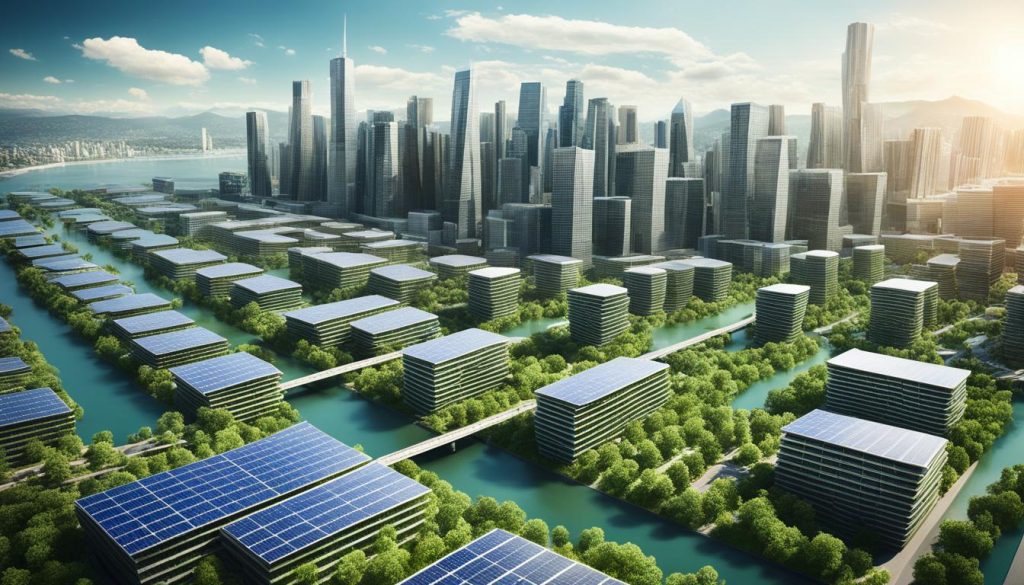Climate change is making its mark, and we must grasp the big financial hit it brings. Studies show it could cut global income by 19% in 25 years1. By 2100, this could jump to a 30% loss, with poor countries hit the hardest.
Climate change’s financial blow is huge, affecting everything from insurance costs to the value of stocks and bonds in carbon-heavy sectors. As climate change worsens, we all need to act fast. It’s key for everyone to take steps to lessen these risks and adjust to the new normal.
Key Takeaways
- Climate change is projected to reduce future global income by 19% in the next 25 years1
- The poorest regions will suffer the biggest monetary hit from climate change1
- Rising insurance costs and deductibles due to increased risk of damage from climate-related events
- Long-term devaluation of stocks and bonds in carbon-intensive industries
- Proactive steps are necessary to mitigate financial risks and adapt to climate change
- Climate risk management
- Environmental risk mitigation
- Climate-resilient infrastructure
The Economic Toll of Climate Change
Climate change is hitting our wallets hard, with a study showing it could cut global income by 19% in 25 years2. The poorest areas will feel the pinch the most, with the U.S. facing an 11% drop in income2.
Climate change’s economic damage is expected to worsen, with U.S. weather disasters costing over $165 billion last year, making it the third most costly year ever2. This has led to new budget plans for FY 2024 to tackle climate risks2.
By the end of the century, crop insurance costs could jump by more than $2.2 billion due to climate change2. There could also be a 30% drop in heating needs and a 60% rise in cooling needs, affecting energy use and aid programs2.
The Biden-Harris Administration is working to cut greenhouse gas emissions by 40% by 2030, reducing the long-term costs of climate change2. The FY24 budget includes $52.2 billion to fight climate change, the largest ever2.
By 2100, the economic hit from climate change could double, with poor countries facing a 61% bigger income loss than rich ones3. Already, climate disasters in North America have cost $415 billion in the past three years, mainly from wildfires and hurricanes3.
The Midwest’s floods and potential damage to coastal infrastructure could lead to trillions of dollars in losses, highlighting the urgent need for action3. The cost of acting now is less than the cost of not acting, making it crucial to invest in fighting climate change4.
“Tackling climate change as part of a broader transition could potentially add 1% to GDP in G20 countries by 2021, and 2.8% by 2050.”4
By investing in sustainable practices and green solutions, we can build a resilient future and lessen the economic blow of climate change4. The journey ahead is tough, but ignoring the economic impact of climate change is not an option3.
Rising Insurance Costs and Deductibles
Extreme weather events are getting more common and intense because of climate change. This is making the insurance industry face big financial challenges5. In Iowa, insurance companies paid out much more than they made in 2020 on homeowners insurance5. This shows how the industry’s profits have changed over the last ten years.
Insurers lost $1.3 billion in Iowa last year, which is four times more than before5. This affects a state with three million people. Now, insurance problems are moving from areas already hit by climate change to places like Iowa, Arkansas, Ohio, Utah, and Washington5.
The insurance industry is under a lot of pressure6. Homeowners insurance costs went up by 21% from May 2022 to May 2023 on average6. In Arizona, the average home saw a 26% increase in insurance costs6. Louisiana saw 22 insurers leave the homeowners insurance market in three years6.
Homeowners insurance premiums jumped by 35% in Florida and 27% in Louisiana from May 2022 to May 20236.
Natural disasters are making homeowners insurance more expensive, especially in risky areas7. The U.S. saw twenty-two disasters in 2020 that caused over $1 billion in damage, almost double the previous record7. Policy premiums went up by 12.1% in the U.S. from 2021 to 2022, with bigger increases in places like Arkansas, Washington, and Colorado7.
Insurance companies are changing their policies to handle climate risks better7. They’re raising deductibles and not renewing some policies in high-risk areas7. This means less insurance is available in some places, making homeowners look for less reliable options5.
Insurers should use climate risk in their decisions and support sustainable practices7. By teaching policyholders how to reduce their carbon footprint and adapt to climate change, insurers can help make big changes7.
“The industry has seen sustained losses between 2008 and 2012, and experts note that the past decade has been uniquely impacted by climate change, resulting in losses increasing faster than insurers can afford.”5
Homeowners, policymakers, and the insurance industry need to work together to find new solutions and adapt to these changes567.
The Financial Impact of Climate Change: How to Prepare
Climate change will deeply affect the financial world, especially in sectors like agriculture, insurance, and real estate8. It’s vital for people and companies to manage these risks early and find ways to lessen the damage.
Rising sea levels pose a big threat to coastal properties, making them less valuable. Studies show homes in Florida could lose 15% to 35% of their value by 20508. Climate change can also hurt industries, impacting investment returns. To protect your money, invest in sectors less affected by climate change and look into sustainable options like ESG funds and green financing8.
Climate risks can lead to higher insurance costs, health expenses, and more. Damage to property and infrastructure can also make it hard to access financial services8.
Strategies for Preparing for the Financial Impacts of Climate Change
Here are ways to get ready for climate change’s financial effects:
- Learn about climate risks in your area and their financial effects. Tools like the Climate Mapping for Resilience and Adaptation can guide you8.
- Invest in infrastructure that can withstand climate changes to lessen damage and protect your assets8.
- Look into financial products that support the environment, like green financing and ESG funds8.
- Support policies that offer financial help for climate change impacts, like disaster relief and adaptation funds9.
- Keep up with research on climate change’s financial effects and adjust your plans as needed10.
By acting early, you can protect your finances and help create a sustainable future8910.
“The potential for negative financial impacts is based on the combination of hazards, exposure, and vulnerability to climate change.”
Preparing for Climate Change’s Financial Impact
Climate change’s effects are getting worse, and it’s key to protect your money. Start by reviewing your home insurance to make sure it covers climate disasters like floods and storms11. Also, think about making your home stronger against extreme weather with upgrades11.
Building an emergency fund for 6 months is smart too. This fund helps you survive during crises and when climate issues hit11.
You can also fight climate change by choosing investments in green solutions. Put money into renewable energy, green bonds, or ESG funds12. This helps the move to a low-carbon economy and supports new tech and infrastructure12.
Lowering your carbon footprint daily helps too. Use less energy, pick efficient appliances, and choose eco-friendly transport11. These steps, along with knowing climate change’s financial risks, prepare you for the future12.
“The cost of achieving the UN’s Sustainable Development Goals in a way compatible with the Paris Agreement is estimated at $6.9 trillion a year to 2030 by the OECD.”12
Getting ready for climate change’s money impact makes you stronger financially and helps everyone fight for a better future13. What we do now affects the future for many generations.
Adaptation and Resilience Initiatives
- The U.S. government has launched a plan involving 19 federal agencies to accelerate adaptation action and support vulnerable countries and communities13.
- The plan emphasizes strengthening climate information services and early warning systems to equip decision-makers with necessary information for effective actions13.
- Focus areas for adaptation include food security, water, health, infrastructure, and climate resilience of key services to address the impacts of climate change13.
By using these strategies, you protect your money and help everyone work towards a sustainable future111213.
Conclusion
Climate change poses big financial risks, like higher insurance costs and utility bills, and could even lower the value of some assets14. From 2016-2018, climate disasters cost the world $650 billion. By 2100, damages could hit $54-$69 trillion14. But, you can take steps to protect your money.
Investing in sustainable options and cutting your carbon footprint is a good start. Switching to sustainable growth could bring in $26 trillion and create over 65 million jobs by 203014. Green financing and carbon pricing can also encourage actions to reduce environmental risks.
Spread out your investments, make your home more climate-ready, and push for ESG in finance to prepare for climate change15. These actions help protect your money and support a sustainable future.
FAQ
What is the projected economic impact of climate change?
How will climate change impact insurance costs and deductibles?
How can I prepare for the financial impacts of climate change?
Source Links
- HTNET2022006.pdf
- The Importance of Measuring the Fiscal and Economic Costs of Climate Change | OMB | The White House
- How Climate Change Impacts the Economy
- How will acting on climate change affect the economy?
- As Insurers Around the U.S. Bleed Cash From Climate Shocks, Homeowners Lose
- Will climate change make your homeowners insurance unaffordable? Here’s what you need to know
- Can Insurance Companies Combat Climate Change?
- FACT SHEET: The Impact of Climate Change on American Household Finances
- Responding to the Financial Impacts of Climate Change | OMB | The White House
- The Impact of Climate Change on American Household Finances
- Climate change impacts are increasing for Americans
- Climate economics – costs and benefits
- Climate economics – costs and benefits
- Climate Change and Financial Stability



